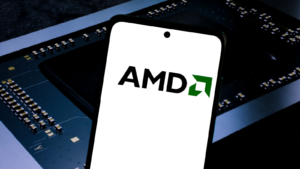
Sustained growth and prosperity: Isn’t that what everyone wants? The answer is generally a resounding ‘yes’ whether it applies to human beings or the stock market. Yet, it isn’t always that easy to identify clear cut winners five years into the future. So, identifying stocks primed for growth and prosperity through 2030 in 2024 can be tricky.
The best way to do so is to focus on companies that are strong, growing, and which are in growth areas that are expected to continue growing. Again, this sounds simple but the devil is in the details. Look back five years and it’s easy to find stocks that Wall Street loved at the time that simply haven’t succeeded.
It’s just how it goes. Regardless, the seven stocks discussed below appear well positioned for the future. Let’s take a look at them in greater depth.
AMD (AMD)

AMD (NASDAQ:AMD) stock has recently emerged as the ‘other’ artificial intelligence giant to watch for the long-term. The ‘other’ artificial intelligence company will be discussed as well in this article.
The emergence of AMD as a valid competitor for dominance in the AI sector has resulted in a booming share price over the past few months. I have to assume that a lot of investors are somewhat skeptical, that’s natural. However, I keep reverting to recent comments by CEO Lisa Su.
Sue forecasts that the AI Data Center Market will be worth $400 billion by 2027. According to analysts, even if it reaches only half of that figure, that would equate to 25% annual growth.Those same analysts calculate that would result in a quadrupling of AMD share price from its price which was then $130.
That’s a strong piece of news. The other thing to note is that AMD has an excellent opportunity as the price to performance AI chip provider. A lot of companies are showing strong signs of weariness when it comes to AI chip prices. AMD’s chips might be slightly less advanced but it might not matter because the price to performance ratio might make up the difference.
Linde (LIN)

Linde (NASDAQ:LIN) is an industrial gas stock and a company that is highly likely to continue to grow and prosper. The company provides various gases to a variety of industries and is highly diversified. That diversification allows the company to withstand market fluctuations and grow in a stable manner.
The company sells a portfolio of gases including hydrogen, oxygen, argon, and nitrogen throughout multiple industry verticals. However, it is hydrogen which is probably the most compelling at the moment. The company has committed to developing its clean hydrogen business.
Linde recently signed an agreement to provide $1.8 billion of clean hydrogen to a blue ammonia project in the Gulf Coast.The company is essentially building the largest Greenfield blue ammonia site in the U.S. It’s one of many reasons that investors have identified Linde as a vital firm in the low carbon energy economy of the future.
The other thing to note about Linde is that it is a very stable company otherwise. It represents a strong mix of diversified investment in future growth areas and strong, stable performance today.
Grab Holdings (GRAB)

Grab Holdings (NASDAQ:GRAB) stock has been difficult to understand over the past few years. Difficult may be the wrong word, perhaps disappointing is more appropriate.
Disappointing because the do-it-all app platform was pegged to become a dominant regional player. It represents markets across the high growth region of Southeast Asia. The region is becoming globally interesting to investors and so there was a lot of hope related to Grab Holdings.
That hope had faded over the past few years but is arguably changing because the company reached a milestone recently: profitability. In Q4, Grab Holdings reported $11 million in profits on $651 million in sales.
The company is entering a new era and continues to trade for just over $3. It may not be prosperous now but it is growing – by 30% in Q4 – which makes it attractive. If the company can continue to be profitable it will be able to change a lot of minds and make a lot of money for investors in the process.
Nvidia (NVDA)

Nvidia (NASDAQ:NVDA) will crop up on almost every list of stocks discussing sustained growth and prosperity through the year 2030.
It dominates the market for chips used to train AI models and those used in data centers. The presumption is that Nvidia’s most recently unveiled chips called Blackwell will continue to dominate for the next few years at least. Blackwell chips are expected to perform five times better than current generation chips across a range of workloads.
In short, those chips will make everything from AI model training to data center workload processing much faster and more efficient. That’s why it’s expected they will sell for as much as $50,000 per current estimates. Investors should expect more of the same moving forward: companies will scramble to secure their portion of that chip supply making Nvidia all the more valuable.
It’s essentially become a question of how high Nvidia can move over the next few years. Many expect that share prices could reach $5,000 by 2030.
Li Auto (LI)

Li Auto (NASDAQ:LI) stands out other manufacturers in the EV sector for a very simple reason. The company has managed to reach profitability while growing rapidly, positioning the stock for growth and prosperity.
The company has reported profitability in each of the last three quarters. Meanwhile, the EV sector is littered with dozens of failing companies that bleed millions of dollars weekly if not daily. The result is that Li Auto has emerged as one of the companies that clearly has a viable business model.
Li Auto’s most recent earnings report is particularly impressive. The company delivered just over 376,000 vehicles in 2023. That figure represented a near tripling of the number of deliveries by the company a year earlier. Net income increased by more than 2,000% during the fourth quarter. Investors shouldn’t expect that sort of growth each and every quarter but it is impressive. Overall, Li Auto has emerged as one of the most solid performers in the Chinese EV market which is going to continue to dominate.
Microstrategy (MSTR)

Microstrategy (NASDAQ:MSTR) should continue to grow because of the large Bitcoin (BTC-USD) holding of the analytics firm. The company holds a massive trove of Bitcoin within its treasury which has made its stock notable.
Microstrategy holds more than 214,000 Bitcoin currently. The company bought those Bitcoin at an average price of $33,706. As I write this, BTC is valued at $65,000. Make no mistake about it, it is the large stake in BTC that will dictate Microstrategy’s future. Investors are much less interested in its business intelligence and analytics business to be perfectly clear.
The value of that stake is currently somewhere in the neighborhood of $14 billion. The price difference between purchase price and current price results in a lot of equity for the firm. That equity gives Microstrategy leverage and should continue to do so into the future. Some suggest Bitcoin prices could eclipse $100,000 by early 2025.
It’ll be interesting to see what happens but it appears that BTC is here to stay and will be very valuable.
Lithium Americas (LAC)

Lithium Americas (NYSE:LAC) is a stock with 10x potential and more. Investors will continue to wonder about its ability to develop the Thacker Pass resource to its full potential. Lithium Americas controls Thacker Pass which is one of the biggest lithium resources globally.
It’s easy to imagine the young company becoming a vital link in the EV supply chain by 2030. However, the collapse of lithium prices jeopardizes its prospects over the long term. I’d reply that EV sales are expected to grow by more than 20% this year. It’s likely that lithium sales will return.
Lithium Americas is well funded with strategic investments from General Motors (NYSE:GM) and the Department of Energy. Lithium prices are expected to rebound by late 2024 or sometime in 2025. Lithium Americas is shaping up to be the kind of company that is just too important overall. It will continue to be volatile but by 2030 the company should be much more stable. Absent a total collapse of the EV market, it should also have multiplied in price many times.
On the date of publication, Alex Sirois did not have (either directly or indirectly) any positions in the securities mentioned in this article. The opinions expressed in this article are those of the writer, subject to the InvestorPlace.com Publishing Guidelines.




